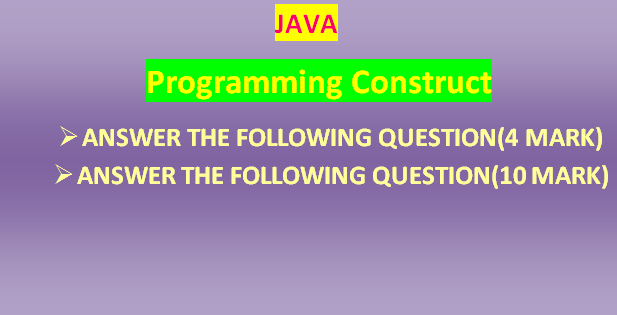JAVA
Programming Construct
Answer
the Following Questions
(4
marks)
1.Write a
program for if else
class IfDemo2{
public static void main(String args[]){
int a,b,c;
a=20;
b=34;
c=25;
if (a>b&&a>c){
System.out.println("A is bigger");
}
else{
if(b>c){
System.out.println("B is bigger");
}
else{
System.out.println("C is bigger");
}
}
}
}
2.Write a
program for else if ladder
class ElseIfLadder{
public static void main(String args[]){
int mark=65;
if(mark>=90){
System.out.println("A Grade");
}
else if(mark >=80){
System.out.println("B
Grade");
}
else if(mark >=70){
System.out.println("C Grade");
}
else if (mark >=60){
System.out.println("D Grade");
}
else{
System.out.println("F Grade");
}
}
}
3.Write a
program for switch case using Arithmetic Operator
import java.util.*;
class SwitchDemo
{
public static void main(String args[])
{
int
val1,val2;
char opr;
Scanner sc=new Scanner(System.in);
val1 = sc.nextInt();
val2 = sc.nextInt();
opr = sc.next().charAt(0);
switch (opr)
{
case '+':
System.out.println("Sum = " + (val1+val2));
break;
case '-':
System.out.println("Difference = "+ (val1-val2));
break;
case '*':
System.out.println("Product = " + (val1*val2));
break;
case '/':
System.out.println("Quotient = " + (val1/val2));
break;
default:
System.out.println("Invaild choice");
}
}
}
4.Write a
program for break and continue
Break
class BreakDemo
{
public static void main(String
args[])
{
int i=0;
while(i<10)
{
if(i==5)
{
break;
}
else
{
System.out.println(i);
}
i++;
}
}
}
Continue
class ContinueDemo
{
public static void main(String
args[])
{
int i=0;
for(i=0;i<10;i++)
{
if(i==5)
{
continue;
}
System.out.println(i);
}
}
}
5.Write a
program for labeled loop
class BreakLoopDemo{
public static void main(String args[]){
boolean t =true;
first: {
second: {
third: {
System.out.println("Before the break.");
if(t)
break second;
System.out.println("This
won't execute");
}
System.out.println("This won't execute");
}
System.out.println("This is after
second block.");
}
}
}
6.Write a
program for Floyd Triangle
class FloydTriangle{
public static void main(String
args[]){
int i,j,r;
for(i=0;i<5;i++){
r=i%2;
for(j=0;j<=i;j++){
r=(r==0)?1:0;
System.out.print(r+”\t”);
}
System.out.println(“\n”);
}
}
}
7.Write a
program for Reverse the Number
class ReverseNum{
public static void main(String
args[]){
int num=12345;
int revnum=0;
System.out.println(“Number:”+num);
while(num>0){
revnum=revnum*10+num%10;
num/=10;
}
System.out.println(“Reversed Number:”+revnum);
}
}
8. Write a program for below condition
1
2 3
4 5 6
7 8 9 10
class NumberTable{
public static void main(String
args[]){
byte i,j,k;
for(i=1,k=1;k<=5;k++)
{
for(j=1;j<=k;i++,j++)
System.out.println(i+”\t”);
System.out.println(”\n”);
}
}
}
9.Write a
program for sum of even number and sum of odd number
class SumOddEven{
public static void main(String
args[]){
int OddSum=0,EvenSum=0;
for(int i=1;i<=100;i++){
if(i%2==0)
EvenSum+=i;
else
OddSum+=i;
}
System.out.println(“Sum of Odd Numbers:”+OddSum+”\nSum of
Even Numbers:”+EvenSum);
}
}
10.Write a
program to print 1 to 100 using for loop
class ForDemo
{
public static void main (String args[])
{
for (int i = 1; i<=5;i++)
{
System.out.print("\t"+i);
}
}
}
Answer
the Following Questions
(10
marks)
1.Write a
Program for Looping statement
o
For
o
While
o
Do while
For:
The for loop, repeats a statement or
block of statements some number of times until a condition is matched. for
loops are frequently used for simple iteration in which you repea a block of
statements a certain number of times and then stop, but you can use for loops
for just about any kind of loop.
The for loop in Java looks roughly like
this:
Syntax
for(initialization;
condition checking;increment/decrement){
statement;
}
class ForDemo
{
public static void main (String
args[])
{
for (int i = 1; i<=5;i++)
{
System.out.print("\t"+i);
}
}
}
While loop
Syntax:
While (condition){
bodyOfLoop;
}
File name: WhileDemo.java
class WhileDemo{
public static void main (String
args[]){
int nos = 1;
int x = 1;
System.out.println("First five odd nos:\n");
while(nos<=5)
{
System.out.print("\t"+x);
x=x+2;
nos = nos+1;
}
}
}
DO........WHILE LOOPS
The do loop is just like a while loop, except that
do executes a given statement or block until the condition is false. The main
difference is that while loops test the condition before looping, making it
possible that the body of the loop will never execute if the condition is false
the first time it's tested. do loops run the body of the loop at least
once before testing the condition. because the condition to evaluate is
given at the end. do loops look like this:
Syntax:
do{
bodyOfLoop;
}while(condition);
Example
File name: DoDemo.java
class DoDemo
{
public static void main (String args[])
{
int x=1;
do{
System.out.println("Looping,round"+x);
x++;
}while
(x<=10);
}
}
2.Write a
Program for if statement
§ If
§ If
else
§ Nested
if
§ Else
if ladder
If
if (condition)
statement1;
if (condition)
statement2;
Example
1:
File
name:IfDemo.java
class IfDemo{
public
static void main(String args[]){
int a=10;
if(a>0)
{
System.out.println("A is positive");
}
if(a<0)
{
System.out.println("A is Negative");
}
}
}
The output appears as
given below:
If else
if (condition)
statement1;
else
statement2;
Example2:
File
name: IfDemo2.java
class IfDemo2{
public static void main(String args[]){
int a,b,c;
a=20;
b=34;
c=25;
if (a>b&&a>c){
System.out.println("A is bigger");
}
else{
if(b>c){
System.out.println("B is bigger");
}
else{
System.out.println("C is bigger");
}
}
}
}
Nested
if's
A nested if is if statement that is the
target of another if or else. Nested if's are very common in programming.
File name : NestedIf.java
class NestedIf{
public static void main(String args[]){
int m=74;
if (m>=50){
if(m>=80){
System.out.println("A Grade");
}
else{
System.out.println("B Grade");
}
}
else{
if(m>=30){
System.out.println("C Grade");
}
else{
System.out.println("Fail");
}
}
}
}
The
if-else-if Ladder
A common programming construct that is
based upon a sequence of nested if's is the if-else-if.
It looks like this:
if(condition)
statement;
else
if (condition)
statement;
else
if (condition)
statement;
...
else
statement;
Example 3:
File name: ElseIfLadder.java
class ElseIfLadder{
public static void main(String args[]){
int mark=65;
if(mark>=90){
System.out.println("A Grade");
}
else if(mark >=80){
System.out.println("B
Grade");
}
else if(mark >=70){
System.out.println("C Grade");
}
else if (mark >=60){
System.out.println("D Grade");
}
else{
System.out.println("F Grade");
}
}
}

No comments:
Post a Comment